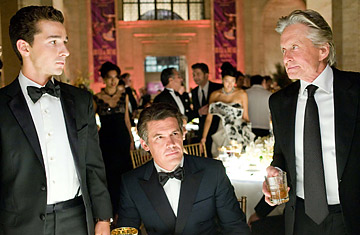
From left, Shia LaBeouf, Josh Brolin and Michael Douglas in Oliver Stone's sequel Wall Street: Money Never Sleeps
(3 of 3)
Bubbles and Baubles
Stone made his writer-director rep with amped-up screeds on Important Subjects: assassinations (JFK), wars in South America (Salvador) and Southeast Asia (Platoon, Born on the Fourth of July, Heaven and Earth) and the media's fascination with serial murderers (Natural Born Killers) and right-wing demagoguery (Talk Radio). In the past decade, with Alexander, World Trade Center and W., he calmed down, and his films slumped into a long lull.
Money Never Sleeps slaps his oeuvre back to life. Rodrigo Prieto's cinematography and Kristi Zea's production design give the movie visual allure in spades. The ribbon of Dow tickers crawls across the actors' faces as if Wall Street were the Matrix. When Stone is not flashing Lou Zabel's ghost on a men's-room wall to haunt Jake's conscience like Christmas Past, he's packing the film with objective correlatives: Zabel speaks of stock bubbles, and we see a kid's soap bubbles rising blithely, precariously over Central Park. (More bubbles can be seen in the movie's recently added epilogue.)
Costing about $70 million but looking as if it had been made on a budget only Lloyd Blankfein could pony up, the picture scampers across Manhattan to drop into the Metropolitan Museum, the World Financial Center atrium and Shun Lee Dynasty and to sport guest spots by Vanity Fair editor Graydon Carter, über-publicist Peggy Siegal, Scarmucci's fellow CNBC shaman Jim Kramer and Stone himself. Wretched excess rarely had such a swank face: a Metropolitan Museum charity dinner where all the swindlers gather, and every concubine is accessorized with gaudy earrings; Jake's engagement gift to Winnie of a Bulgari diamond Liz Taylor would envy; rich men's toys like motorbikes and crash helmets equipped with Bluetooth cell phones. (The ringtone on Jake's phone is Ennio Morricone's coyote-wail theme from The Good, the Bad and the Ugly.)
LaBeouf, who always seemed too seedy and smart to play action heroes in Indiana Jones and Transformers movies, is terrific here as a man who wants to make it big without breaking too many commandments. Most other members of the large cast invest themselves fully in the energy and piranha-like appetites of their roles. Only Mulligan, so charming as the precocious teen in An Education, is distressingly wan and weak as the token saint; she's much better in the current Never Let Me Go, to which she brings gravitas, not just waterworks.
Douglas, looking more Kirkian than ever, struts through most of the movie having almost too much fun; if he was worried that Gekko would be too appealing, it doesn't show in his born salesman's smile. But then he has a big scene, in which Gordon confesses to Winnie his despair over the suicide of her drug-addled brother. As he sobbingly takes responsibility for "how many mistakes I made as a father," Douglas boldly merges his character with his personal life. When the actor's son Cameron was recently sentenced to five years in prison for drug-dealing, Douglas owned up to "being a bad father" and added that without going to jail, Cameron "was going to be dead or somebody was going to kill him."
As social commentary, the script is best when it's bitter. The first two acts are a splendid vaudeville of fast talking and dirty dealing. At the climax, though, the picture becomes Wall Street Weak. It starts flailing toward an Old Hollywood happy ending of revenge and redemption, forcing Gekko to commit a lapse repellent to his nature — a good deed — in his stab at reconstituting his family. A bleaker worldview, truer to the Street's carnivore ethics, would have demanded the abortion of one character's fetus as a final sting and judgment. Instead, the conclusion leaves the main players in place for a Wall Street 3, which Stone has said he's contemplating. So at the end, he assembles most of the cast for a gala birthday party, as if America's Gekkos deserved cake, not prison time, for their deeds. Unless Stone, Loeb and Schiff believe that the stock market really is just a game, with no calamitous consequences, they have seriously breached the satirist's code. Satire is supposed to leave bite marks, not lipstick traces.
Unlike the first movie, made before the 1987 crash, this Wall Street decries financial chicanery from the ethical altitude afforded by hindsight. Set in 2008, it allows Gekko to speak prescient lines written in 2009 for audiences in 2010. (The film does have one serendipitous subplot — the peddling of offshore-oil-drilling leases — suggesting an awareness of the BP scandal. In fact, the movie was finished early this year and had its world premiere at the Cannes Film Festival in May.) No deep thoughts here; this is a product of shiny surfaces and glittering patter, the cinematic equivalent of a derivatives offering. Instead of whacking Wall Street, Stone gives it a poke that ends up a tickle. The movie's cunning strategy — that financiers can bring down their own villains from the inside — should please the mass movie audience. And Anthony Scaramucci too.
